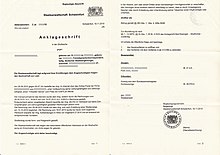Criminal charge
![]()
This article is about the procedural step in criminal proceedings. For the novel by John Grisham, see Indictment (novel); for other meanings, see Under Indictment.
Charges (also called public charges) are brought in criminal proceedings by the prosecuting authority (in many states, the public prosecutor's office) if, after the investigative process has been conducted, there is probable cause to believe that a defendant has committed a criminal offense.
The indictment is thus the beginning of legal proceedings. It precisely identifies the person of the accused. In the indictment, it describes precisely the facts of which the accused is accused and names the criminal provision violated according to its wording. It also interrupts the current statute of limitations. The defendant may comment on the indictment in a plea. In Germany and in most other criminal prosecution systems organized under the rule of law, the so-called accusation principle prevails, according to which the prosecuting authority may not be identical with the sentencing authority. In Germany, under Section 152 of the Code of Criminal Procedure (StPO), only the public prosecutor's office is authorized to bring public charges.
The filing of an indictment on an unsecured factual basis is contrary to the Code of Criminal Procedure, is therefore in breach of official duty, and may open the door to claims for damages.
The written indictment is read out in its essential parts by the prosecutor at the court hearing (main hearing). It is the basis of the oral hearing against the accused. Only the facts described in it are the subject of this hearing, i.e. the court may only include further acts not described in the indictment in this hearing if they were also previously charged in a supplementary indictment (immutability principle).
However, the court is not bound by the legal assessment of the charged facts of life that the prosecution advocates in its indictment. If it assumes that the accused acts are to be judged according to different rules than those stated in the indictment, the court may (and must) judge according to the rules that it believes are correct. However, the court must have pointed out a new legal point of view to the defendant beforehand.
If the court has made a final decision on an accusation (i.e., the facts of life) (possibly also by acquittal), this accusation may not be made the content of an accusation again (ne bis in idem).
The indictment must therefore unmistakably describe the actual event with which the accused is charged. In addition, it should reproduce the relevant wording of the law and cite the applicable regulations, as well as state the evidence and - except in the case of an indictment before the criminal court (single judge at the district court) - summarize the essential result of the investigation.
Unlike the sentencing court (in dubio pro reo), the prosecuting authority must generally proceed on the basis of the principle of in dubio pro duriore. For example, in Swiss military criminal proceedings, if there are sufficient grounds for suspicion of a felony or misdemeanor, the auditor cannot discontinue the proceedings himself (Art. 114 MStP).
If no indictment is filed after the investigation has been completed, the injured party can also take advantage of so-called complaint enforcement proceedings pursuant to Section 172 of the Code of Criminal Procedure (StPO), which are directed at the filing of an indictment. In Austria, a similar instrument exists in the form of a motion for continuation (Section 195 of the Code of Criminal Procedure). Under Swiss law, a discontinuation order can also be appealed to the appeal authority (Art. 322 Para. 2 StPO).
In simpler proceedings in which only a relatively minor penalty is to be expected, the public prosecutor's office can replace the formal indictment with a request for a penalty order (or a penalty mandate). This shortens the court proceedings. A trial only takes place if the defendant appeals against the penalty order.
No prosecutor is the public interest representative in administrative law.

Indictment for fraud (Germany)
See also
- Action for the initiation of proceedings in the civil case
- List of German public prosecutors
Search within the encyclopedia